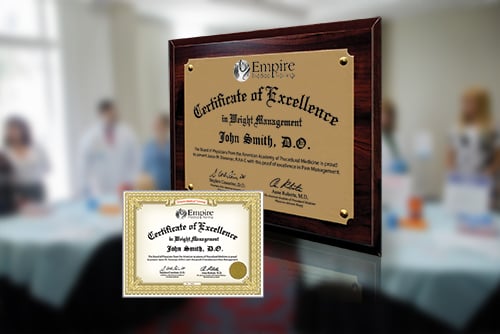What qualifications do I need to become Botox certified?
By Dr. Stephen Cosentino
PRESIDENT OF EMPIRE MEDICAL TRAINING
Botox® injections have become one of the most popular cosmetic procedures in recent years, with approximately 6.2 million treatments performed annually worldwide (and approximately 3.6 million just in the United States). The average cost for a Botox treatment is between $300 and $600, and regular Botox patients typically receive treatments every four months.
However, administering Botox is a medical procedure that requires proper training and certification. Let’s explore the qualifications needed to become certified in Botox injections in the United States.
Educational Requirements
Of course, the first step toward Botox certification is having the necessary medical background. To be eligible for Botox training, you must be a licensed medical professional. This typically includes:
- Physicians (MD or DO)
- Dentists (DDS or DMD)
- Registered Nurses (RN)
- Nurse Practitioners (NP)
- Physician Assistants (PA)
Each of these professions requires completion of an accredited degree program and passing of national licensing exams. For example, physicians must complete four years of medical school and a residency program, while registered nurses need at least an associate's or bachelor's degree in nursing.
State Licensing
In addition to completing the required education, medical professionals must hold a valid, active license in the state where they intend to practice. Licensing requirements vary by state, so it's crucial to check with your state's medical board for specific details. Your license must be in good standing with no disciplinary actions against it.
Botox-Specific Training
Once you have met the educational and licensing requirements, the next step is to complete a reputable Botox certification course like those offered by Empire Medical Training.
These courses are designed to provide specialized training in Botox administration and typically cover:
- Facial anatomy and musculature
- Pharmacology and safety of Botox
- Patient assessment and selection
- Injection techniques
- Potential complications and management
- Hands-on clinical training
How long is a Botox course?
Most basic Botox certification courses can be completed in 1-2 days, though some more comprehensive programs may last 1-2 weeks. Some courses also combine Botox training with certification in dermal fillers, as these treatments are often requested together.
Course Content
A comprehensive Botox certification course should cover the following areas:
Patient Screening and Assessment
- Procedures for initial patient consultation
- Guidelines for assessing patient suitability
- Indications and contraindications for Botox treatments
- Dosing considerations for aesthetic procedures
Botox Handling and Safety
- Proper storage and transportation of Botox
- Dilution guidelines
- Sterile preparation techniques
- Potential risks and side effects
- Post-treatment patient care instructions
Facial Anatomy Education
- Detailed overview of facial muscles and structures
- Neurophysiology and vasculature relevant to Botox injections
Injection Training
- Hands-on practice with live volunteers
- Techniques for common treatment areas (forehead lines, crow's feet, etc.)
- Proper dosing and injection placement
Practice Considerations
- Integrating Botox into an existing medical practice
- Regulatory and licensing considerations
- Patient intake and billing procedures
- Liability insurance requirements
State-Specific Requirements
It's important to note that regulations regarding who can administer Botox vary by state. For example, in some states, registered nurses may be required to work under the direct supervision of a physician when administering Botox. Other states may have additional training or experience requirements beyond basic certification.
Advanced Training Opportunities
Advanced Botox training courses are available for medical professionals who wish to specialize in aesthetic procedures. These may cover:
- Off-label uses for Botox
- Advanced injection techniques
- Treatment of other areas of the body
- Combination treatments with dermal fillers
Choosing a Certification Program
When selecting a Botox certification course, it's crucial to choose one that is accredited by relevant medical authorities. Non-accredited programs may not meet state regulatory requirements and could put practitioners at legal and professional risk. Look for courses that offer:
- Instruction by experienced practitioners
- Hands-on training with live models
- Curriculum developed by leading aesthetic professionals
- Compliance with state regulations
By meeting these qualifications and completing an accredited training program like those offered by Empire Medical Training, medical professionals can become certified to safely and effectively administer Botox injections to their patients. As with any medical procedure, ongoing education and adherence to best practices are essential for maintaining competence and ensuring patient safety.


